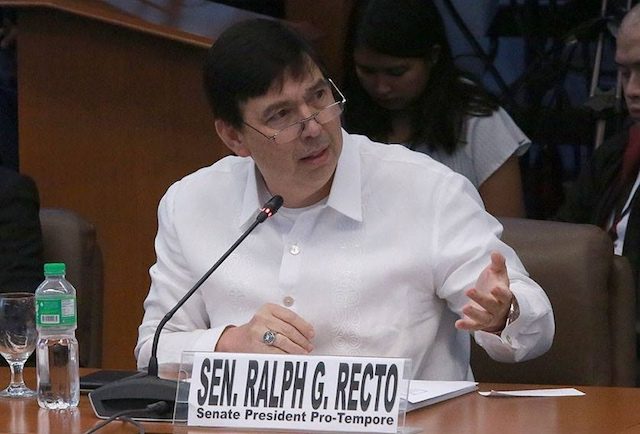SUMMARY
This is AI generated summarization, which may have errors. For context, always refer to the full article.

MANILA, Philippines – Senate President Pro Tempore Ralph Recto filed a resolution seeking an investigation into the surveillance system project of the Department of the Interior and Local Government (DILG) funded by the Chinese government.
“It is imperative that the Philippine government review and evaluate government programs and projects and their impact on national security and public interest,” Recto said in his resolution filed on Wednesday, January 16.
Recto was among the senators who earlier sounded the alarm over the project and its implications on national security.
The DILG has partnered with a China Telecom affiliate and Huawei for the Safe Philippines Project, a 12,000-camera surveillance system for the supposed “efficient management of public order, security, and safety” in the country.
Huawei will supply equipment while China International Telecommunication Construction Corporation (CITCC) will undertake the P20-billion project. CITCC is an affiliate of state-owned China Telecom, one of the firms in Mislatel Consortium which is soon to become the Philippines’ third telecommunications player.
The initial implementation phase of the project is estimated to cost over P20 billion, to be financed and implemented through official development assistance from the Chinese government.
Serious concerns
In his resolution, Recto cited several important things to consider about the project, especially in relation to Chinese laws that apply to its citizens and companies wherever they are, and Huawei’s track record.
He said that while the national security adviser has released a Certificate of No Security Issue to the Safe Philippines Project contractor, “recent developments placed considerable security risk in employing Chinese citizens, corporations, and organizations to implement government programs and projects.”
He noted that China’s National Intelligence Law provides for the following:
- mandates all Chinese organizations and citizens to cooperate with, collaborate in, and guard the secrecy of, the Chinese national intelligence work, with a promise that the Chinese State will protect the individuals and organizations that support, cooperate with, and collaborate in such undertaking
- allows Chinese intelligence agencies to establish cooperative relationships with relevant individuals and organizations, and to commission the latter to carry out relevant assignments
- authorizes Chinese intelligence agencies to demand necessary support, assistance, and cooperation from relevant institutions, organizations, and citizens
Problems with Huawei
“Chinese companies and individuals have also been allegedly involved in espionage and hacking activities over the recent years,” the resolution states.
It adds that Huawei, in particular, “has been increasingly embroiled in issues concerning national security and data protection.”
Recto said in his resolution that the company’s chief financial officer Meng Wanzhou was apprehended in Canada for allegedly helping the company circumvent the United States’ economic sanctions against Iran, while its former sales director was arrested in Poland on charges of espionage.
“There is a mounting concern that China may be using Huawei Technologies Co. Ltd as a proxy in Chinese intelligence operations or as a conduit to access sensitive networks,” the resolution states.
It notes that several countries – the US, Japan, Australia, and New Zealand – have already banned public procurement of equipment from Huawei or have blocked the latter from developing their country’s information and communications technology infrastructure “due to ‘rising security concerns.'”
Recto also cited Republic Act No. 10175 or the Cybercrime Prevention Act of 2012 which “recognizes the need to protect and safeguard the integrity of computer, computer and communications systems, networks, and databases, and the confidentiality, integrity, and availability of information and data stored therein, from all forms of misuse, abuse, and illegal access.”
The senator also referred to the National Security Policy for 2017 to 2022 which “highlighted the need to safeguard the Philippine classified action plans and programs, government intentions, and state secrets from espionage and other hostile actions, and the need to shield the country from computer-generated attacks that could cause massive crises in our economy, banking and financial institutions, communications, and other critical infrastructure.” – Rappler.com
Add a comment
How does this make you feel?
There are no comments yet. Add your comment to start the conversation.